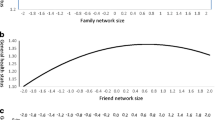Abstract
This paper empirically examines three propositions which are derived from network theory, particularly the relationship between friends' network and happiness level as a subjective well-being indicator. Using friendship network data obtained from 1985 NORC General Social Survey for the U.S., and from 1993 CIRES Social Survey for Spain, a cross-national comparison between Spain and the U.S. was performed. Results are compared with previous major Davis' and Burt's works for the U.S. It was found that there was a significant, strong association between happiness and friends' network size for both countries, and that there was not a great happiness difference between them. However, close friendship has a contrary effect on happiness when data from both countries are compared. Concerning socioeconomic status, happiness increased with income, although this effect was higher in Spain than in the U.S.
Similar content being viewed by others
References
Adams, R. G.: 1986, ‘Secondary friendships networks and psychological well-being among elderly women’, Activities, Adaptation and Aging 8, 59–72.
Andres-Orizo, F.: 1991, Los nuevos valores de los españoles (S.M., Madrid).
Burt, R. S.: 1987, ‘A note on strangers, friends and happiness’, Social Networks 9, 311–331.
Cecil, R., J. Offer and F. St. Leger: 1987, Informal Welfare: A Sociological Study of Care in Northern Ireland (Gower, Aldershot).
Davis, J. A.: 1984, ‘New money, an old man/lady and ‘two's company’: Subjective welfare in the NORC General Social Surveys, 1972–1982’, Social Indicators Research 15, 319–350.
Davis, J. A. and T. W. Smith: 1993, General Social Survey 1972–1993 [machine-readable data file]. Principal investigator, J. A. Davis; Director and Co-Principal investigator, T. W. Smith. NORC ed. (National Opinion Research Center, producer, Chicago) (The Roper Center for Public Opinion Research, University of Conneticut, distributor, Storrs, CT).
De Miguel, A.: 1992, La sociedad española 1992–1993 (Alianza, Madrid).
Gottlieb, B. H. (ed.): 1981, Social Networks and Social Support (Sage Publications, Beverlly Hills).
Granovetter, M. S.: 1973, ‘The strength of weak ties’, American Journal of Sociology 78, 1360–1380.
Granovetter, M. S.: 1974, Getting a Job. A Study of Contacts and Careers (Harvard University Press, Cambridge, MA).
Hughes, M. and W. R. Gove: 1981, ‘Living alone, social integration, and mental health’, American Journal of Sociology 87, 48–74.
Jerrome, D.: 1984, ‘Good company: The sociological implications of friendship’, Sociological Review 32, 696–718.
Jerrome, D.: 1991, “Loneliness: Possibilities for intervention’, Journal of Aging Studies 5, 195–208.
Kadushin, C.: 1966, ‘Friends and supporters of psychotherapy: On social circles in urban life’, American Sociological Review 31, 786–802.
Litwak, E.: 1989, ‘Forms of friendships among older people in an industrial society’, in R. G. Adams and R. Blieszner (eds.), Older Adult Friendship (Sage Publications, Newbury Park, Calif.), 65–88.
Litwak, E. and I. Szelenyi: 1969, ‘Primary group structures and their functions: Kin, neighbours, and friends’, American Sociological Review 34, 465–481.
Matthews, S. H.: 1986, Friendships Through the Life Course (Sage Publications, Beverlly Hills).
Requena, F.: 1991, ‘Social resources and occupational status attainment in Spain: A cross-national comparison with the United States and the Netherlands’, International Journal of Comparative Sociology 32, 233–242.
Requena, F.: 1994, ‘Redes de amistad, felicidad y familia’, Revista Española de Investigaciones Sociológicas 66, 73–89.
Rossi, P.H.: 1966, ‘Research strategies in measuring peer group influences’, in T. M. Newcomb and E. K. Wilson (eds.), College Peer Groups (Aldine, Chicago), 190–214.
Treiman, D. J.: 1977, Occupational Prestige in Comparative Perspective (Academic Press, New York).
Vaux, A.: 1988, Social Support: Theory, Research, and Intervention (Praeger, New York).
Vaux, A. and D. Harrison: 1985, ‘Support network characteristics associated with support satisfaction and perceived support’, American Journal of Community Psychology 13, 245–268.
Veenhoven, R.: 1984, Conditions of Happiness (D. Reidel, Boston).
Wellmann, B.: 1981, ‘Applying network analysis to the study of support’, in B. H. Gottlieb (ed.), Social Networks and Social Support (Sage Publications, Beverlly Hills), 171–200.
Author information
Authors and Affiliations
Additional information
Financial support for this project was provided by the Department of Sociology, UMA, and University Computer Center. I am indebted to Juan A. Villena and Mary Oliver for helpful comments on early drafts, and to R. Hidalgo for computing assistance.
Rights and permissions
About this article
Cite this article
Requena, F. Friendship and subjective well-being in Spain: A cross-national comparison with the United States. Soc Indic Res 35, 271–288 (1995). https://doi.org/10.1007/BF01079161
Accepted:
Issue Date:
DOI: https://doi.org/10.1007/BF01079161



